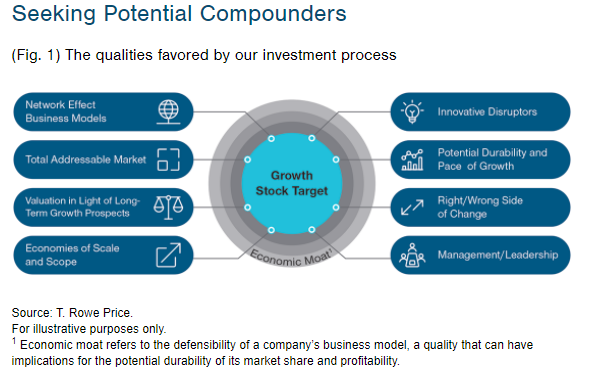The COVID-19 pandemic has had a lot of lasting impacts on day-to-day life and global economies as the world continues to find its footing in the midst of shutdowns, re-openings, and variants like Delta. One of the major impacts of the pandemic has been in the behavior of investors, who have shifted to focus more on short-term, reliable growth stocks, according to a white paper by Joseph Fath, portfolio manager at T. Rowe Price.
In the midst of short-term buying, T. Rowe Price is looking to the long game, choosing to focus on companies that might be undervalued but that have the potential for cash flow growth and strong, sustained earnings over longer timeframes. It seeks companies with business models that have favorable characteristics, including pricing power, high barriers to entry, management teams that can allocate their capital efficiently and effectively, as well as a lack of susceptibility to disruption caused by innovation.
While there is an “emphasis on trying to harness the power of long‑term compounding, we have found that a nuanced understanding of potential innovation and disruption is critical,” Fath explained in the paper. It’s a balancing act of working to find companies that will benefit from innovation but that will not be disrupted by it.
The current environment is one that has favored the high-flyers who have experienced record growth and cyclicals that tend to outperform at the early stages of economic growth and recovery. Fath believes that this has left potential opportunities for investors that focus on growth over longer time periods.
“Our stock selections and position sizing are rooted in our deep understanding of these companies’ business models, the idiosyncratic ways in which their management teams may be able to unlock value for shareholders, and the competitive dynamics within their industries,” Fath wrote.

Source courtesy of T. Rowe Price: Seeking Growth Stories That Can Be Stronger for Longer
This is a focus that doesn’t rely heavily on speculation about the shifting tides of market sentiment and what may bring them about, but instead analyzes how a company is positioned within its industry, as well as its fundamentals and management.
Areas of Growth Potential
By not only evaluating a company’s fundamentals but also understanding the industry it is operating within and any innovation-driven disruptions it might experience, T. Rowe Price works to position its investments into these sometimes-overlooked pockets of growth opportunity. One such area they see great promise in right now is within the healthcare industry as people resume health consultations and elective procedures they may have pushed off due to the pandemic.
Additionally, in understanding the impacts of innovation and disruption, Fath explains that “instances where the market misdiagnoses the risk of disruption sometimes can create a compelling setup for growth investors.”
Such is the case with established payment technology systems, which have taken a great hit from economic shutdown. The mindset that cloud-native and digital-first competitors could cause disruption within the space have driven valuations down; T. Rowe Price believes that the fundamentals and demand exist for these payment systems and that continued innovation in the space as well as increasing demand for online payments will counterbalance the threat of disruption.
Secular Growth Opportunities
T. Rowe Price invests in many of the popular key secular growth trends that tend to ride on the coattails of technological innovation and the disruption it causes, but it does so carefully, acknowledging the constantly changing currents of technological disruption.
Some areas that T. Rowe Price invests in within secular growth include online media, e-commerce and online payments, and the transition of the automotive industry to electric vehicles, where innovation works alongside disruption.
This is especially true within the software industry, where the firm looks for companies offering quality products and solutions that are driven by management teams that focus on innovation.
“The rapid pace of innovation taking place in certain segments of the software industry also means that investors must remember that disruptors can become the disrupted,” Fath wrote. “This caveat is especially true for providers of security software, an area where product cycles historically have been shorter because the threat vectors and competing products are constantly evolving.”
T. Rowe Price sees particular potential in e-commerce and digital payments, both have which have benefited from an economy that has largely been based from home during the pandemic. One such example is online grocery shopping, which saw a spike with the pandemic and is an area that the firm believes has continued room for growth.
T. Rowe Price also sees further potential in image and video-intensive platforms, which have room to grow in the areas of interactive and social commerce. All of these are areas that have experienced growth and innovation during the pandemic as companies worked to meet the needs of consumers, creating new technologies and continuing to drive industries forward.
“We believe that our rigorous fundamental research into public and private companies and deep understanding of disruptive innovation may give us an edge in identifying investment opportunities where the market does not fully appreciate the potential durability of a company’s growth story,” said Fath.
T. Rowe Price currently offers several growth focused ETFs that are all actively managed: the T. Rowe Price Blue Chip Growth ETF (TCHP); the T. Rowe Price Dividend Growth ETF (TDVG), and the T. Rowe Price Growth Stock ETF (TGRW).
For more news, information, and strategy, visit the Active ETF Channel.








